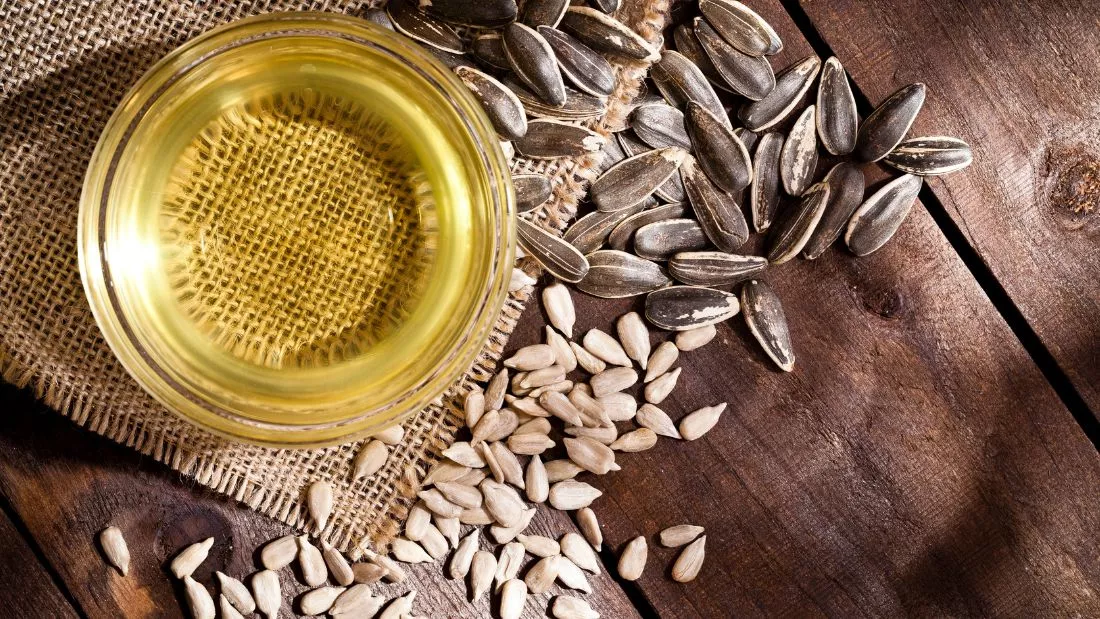Sunflower seeds and oil

Where does sunflower come from?
Sunflowers are native to North America and were originally grown as a crop by indigenous tribes. Native Americans cultivated them from wild, multi-headed types to produce a single-stemmed plant bearing a large flower. Some archaeologists suggest that sunflowers may have been domesticated even earlier than corn.
Sunflower seeds were ground into flour to make bread and cakes or the flour was mixed with beans, squash and corn to make a nourishing meal. The seeds were roasted, cracked and eaten whole, either as a snack or mixed with other grains, nuts and pulses into a type of granola. There are also historical records of sunflower oil extraction – the oil was then mostly used in bread making.
In the 16th century, Spanish conquistadors brought sunflower seeds to Europe but the plant was initially only grown for its pretty flowers. It wasn’t until the 18th century that sunflowers started being cultivated for their seeds.
Sunflower seed nutrients
One tablespoon of sunflower seeds delivers almost two grams of protein, small amounts of B vitamins and three milligrams of vitamin E. The recommended daily intake of vitamin E is three milligrams for women and four milligrams for men – so one tablespoon of these tiny seeds supplies just about your daily dose!
Vitamin E is an important antioxidant that helps neutralise free radicals – metabolism by-products that can damage our cells – and prevents cholesterol particles in the blood from oxidising. Cholesterol particles only become dangerous when they are oxidised and become ‘sticky’, which enables them to attach to the inner walls of arteries. By preventing this process, vitamin E helps to protect blood vessels and maintain healthy blood pressure – and it also has anti-inflammatory properties. What’s more, a diet rich in vitamin E contributes to healthy skin and protects it from damage.
Sunflower seeds are also a good source of minerals – one tablespoon providing moderate amounts of iron, magnesium, manganese, copper, selenium and zinc. These are vital for oxygen transport around the body, healthy muscles, joints and bones; for, the immune system, blood pressure regulation and more. However, unless you eat sunflower seeds in large quantities, you’ll also need richer sources of these minerals in your diet.
Sunflower seeds also offer a wealth of antioxidants, such as flavonoids and that explains why they used to be considered medicine! Their antioxidants don’t just help to protect your tissues from everyday damage but are also anti-inflammatory, anti-bacterial and help to keep your blood vessels healthy.
How to use sunflower seeds
Being mainly a source of protein and vitamin E, they make a great topping – for morning cereal, smoothies, soup or salad. Roasted and salted sunflower seeds are a lovely savoury snack but can add too much salt to your diet so it’s best to combine them with other unsalted nuts and seeds. You can also find sunflower halva – the sweet delicacy usually made from sesame seeds.
Their crunchiness and small size make sunflower seeds perfect for adding texture to a range of dishes – from beanburgers, bread and risotto to biscuits and muffins.
Fun fact
Sunflower seeds may turn blue-green when baked – a harmless chemical reaction between the seeds’ chlorogenic acid and baking soda. If you’d rather not have blue seeds in your baked goods, reduce the amount of baking soda.
Sunflower oil
Sunflower oil is cheap and popular but from a health perspective, it’s not the best choice. It is high in unsaturated omega-6 fats and although we need some, it’s easy to get too much and an omega-6 overload can contribute to inflammation in the body and block the absorption of healthier omega-3s. The other fats in sunflower oil are mostly monounsaturated – not harmful but not essential either.
One study found that compared with other oils, sunflower oil released the highest amount of aldehydes during cooking – toxic compounds produced when oil is heated and starts to oxidise. They can damage your DNA and cells and, if consumed regularly, can contribute to a range of degenerative diseases.
The longer the oil is exposed to heat, the more aldehydes form so if you want to use it, it’s best to choose gentler and shorter cooking methods, such as stir-frying rather than deep frying.
One benefit to sunflower oil is its vitamin E content but other than that, it doesn’t offer any advantages over other oils. You’re better off with rapeseed oil for cooking and baking because it’s rich in essential omega-3 fats and more stable in higher temperatures. For cold dishes, virgin olive oil is the best choice due to its high antioxidant content.
What’s the verdict?
Sunflower seeds are a great and affordable source of vitamin E, protein and a range of essential minerals which are a healthy addition to your diet. However, sunflower seed oil isn’t the best for health so choose a different oil for your culinary adventures.
From a sustainability perspective, sunflowers make an excellent crop because they don’t require irrigation and little in the way of fertilisers or pesticides. They provide food for pollinators and being grown all over Europe makes them a widespread local food. Sunflowers are very much eco-friendly and sustainable.




